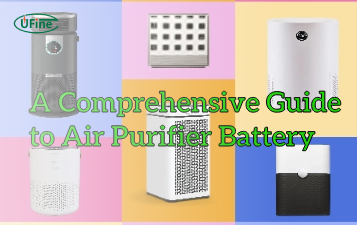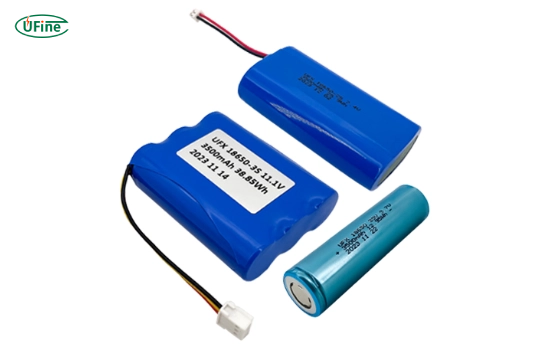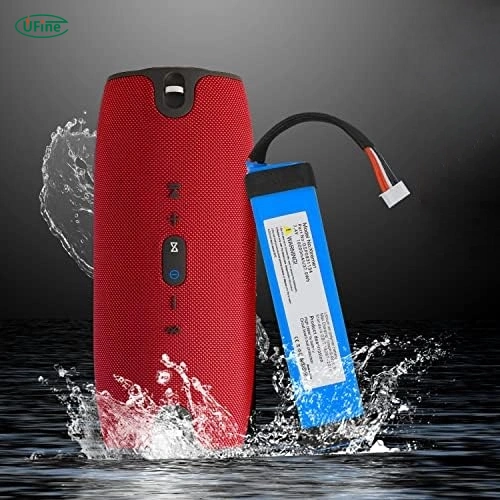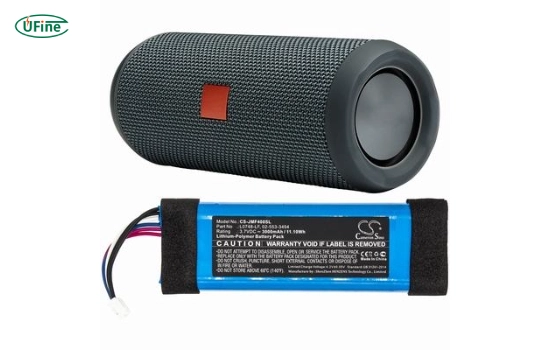
- Part 1. What is an ion speaker?
- Part 2. Why is choosing the right battery important?
- Part 3. Types of batteries suitable for ion speakers
- Part 4. How does the battery type affect the performance of an ion speaker?
- Part 5. Key factors to consider when choosing a speaker battery
- Part 6. How do you determine the suitable battery capacity?
- Part 7. Where to buy replacement batteries?
- Part 8. How do you install a new battery for your ion speaker?
- Part 9. Maintenance tips for your ion speaker battery
- Part 10. FAQs
A reliable ion speaker is essential for enjoying music outdoors or at events. However, the performance of your ion speaker heavily relies on the battery you choose. This guide will walk you through everything you need to know about selecting the best battery for your ion speaker, ensuring you can enjoy uninterrupted music for hours.
Part 1. What is an ion speaker?
An ion speaker is a portable Bluetooth speaker designed to deliver high-quality sound while being easily transported. These speakers are perfect for outdoor gatherings, picnics, and parties. They often come with features like built-in lights, waterproof designs, and long battery life, making them ideal for various settings.
Part 2. Why is choosing the right battery important?
Selecting the right battery for your ion speaker is crucial for several reasons:
- Performance: The right battery ensures your speaker operates at optimal levels, providing transparent sound and sufficient volume. A well-matched battery can enhance audio quality, allowing you to enjoy your favorite tracks as intended.
- Battery Life: A quality battery will extend the playtime of your speaker, allowing you to enjoy your music for longer without needing to recharge. Outdoor events often limit access to power, so it’s essential to consider this factor.
- Safety: A compatible battery reduces the risk of overheating or damaging your speaker, ensuring a safe audio experience. Batteries unsuitable for your device can lead to malfunctions or even hazardous situations.
Part 3. Types of batteries suitable for ion speakers
When choosing a battery for your ion speaker, you’ll typically encounter the following types:
- Lithium-ion Batteries: These are the most common type used in portable speakers. They offer high energy density, lightweight design, and longer life cycles. Lithium-ion batteries can typically handle numerous charge cycles, making them a long-lasting option.
- Nickel-Metal Hydride (NiMH) Batteries: While less common, NiMH batteries are also an option. They are more environmentally friendly but generally have a lower energy density than lithium-ion batteries. NiMH batteries may be suitable for users looking for a greener alternative, though they may require more frequent recharging.
- Lead-Acid Batteries: These batteries are often used in more prominent speakers or systems that require more power. However, they are heavier and less portable. Lead-acid batteries may benefit stationary setups where weight is not a concern.
Part 4. How does the battery type affect the performance of an ion speaker?
The type of battery you choose can significantly impact the performance of your ion speaker. Here’s how:
- Energy Density: Lithium-ion batteries have a higher energy density than NiMH and lead-acid batteries. This means they can store more energy in a smaller space, allowing for a lighter and more portable speaker without sacrificing playtime.
- Charge Cycles: Lithium-ion batteries typically offer more charge cycles than NiMH or lead-acid batteries. This longevity means you can charge and discharge them many times without significant degradation, which is crucial for users who frequently use their speakers.
- Temperature Sensitivity: Different battery types respond differently to temperature changes. Lithium-ion batteries perform well in various temperatures, while lead-acid batteries may struggle in extreme heat or cold, affecting the speaker’s performance.
- Self-Discharge Rate: Lithium-ion batteries are lower than NiMH batteries, meaning they retain their charge longer when not in use. This is particularly beneficial for users who may not use their speakers regularly.
Part 5. Key factors to consider when choosing a speaker battery
When selecting a battery for your ion speaker, consider the following factors:
- Capacity (mAh): The battery capacity, measured in milliamp hours (mAh), indicates how long the battery can power the speaker. A higher mAh rating typically means more extended playtime. For instance, a 5000mAh battery may provide significantly longer usage than a 2000mAh battery.
- Voltage: Ensure the battery’s voltage matches the specifications of your ion speaker. Using a battery with the wrong voltage can damage your speaker. Always check the manufacturer’s guidelines for the recommended voltage range.
- Size and Weight: If portability is a concern, consider the battery’s size and weight. A compact and lightweight battery is preferable for on-the-go use. Larger batteries may provide more power but can be cumbersome to transport.
Part 6. How do you determine the suitable battery capacity?
To determine the correct battery capacity for your ion speaker, consider the following:
- Speaker Power Consumption: Check the speaker’s power rating, which is usually listed in watts (W). This will help you understand how much energy the speaker uses. For example, if your speaker consumes 15W, you must calculate the battery capacity based on your desired playtime.
- Desired Playtime: Decide how long you want to use the speaker on a single charge. For example, if your speaker consumes 10W and you want 5 hours of playtime, you would need a battery with at least 50Wh (10W x 5h).
Part 7. Where to buy replacement batteries?
You can find replacement batteries for your ion speaker at various locations:
- Official Manufacturer’s Website: Always check the manufacturer’s website first for compatible batteries. For instance, Uifne Battery offers OEM and ODM services, providing tailored battery solutions that meet specific requirements for various ion speaker models.
- Electronics Retailers: Stores like Best Buy or online platforms like Amazon often carry batteries for portable speakers. These retailers typically offer a wide selection, making finding the right battery for your device easier.
- Local Electronics Stores: Visit local electronics shops with compatible batteries in stock. Staff members can often advise on the best options for your specific speaker model.
Part 8. How do you install a new battery for your ion speaker?
Installing a new battery in your ion speaker can be straightforward. Here’s a step-by-step guide:
- Power Off the Speaker: Always turn off your speaker before attempting to replace the battery. This ensures safety and prevents any potential damage.
- Open the Battery Compartment: Locate the battery compartment at the back or bottom of the speaker. Some models may require a screwdriver to open.
- Remove the Old Battery: Carefully disconnect and remove the old battery from its compartment. Note how the battery is connected to ensure proper installation of the new one.
- Insert the New Battery: Place the new battery in the compartment, ensuring it is securely connected. Make sure the positive and negative terminals are aligned correctly.
- Close the Compartment: Once the new battery is in place, close the battery compartment and power on your speaker. Test the speaker to ensure it is functioning correctly with the new battery.
Part 9. Maintenance tips for your ion speaker battery
To extend the life of your ion speaker battery, follow these maintenance tips:
- Avoid Deep Discharge: Avoid letting the battery discharge completely before recharging. This can shorten its lifespan. Aim to recharge the battery when it reaches around 20% capacity.
- Store Properly: If you’re not using the speaker for an extended period, store it in a cool, dry place and charge it to about 50%. This helps maintain the battery’s health and prevents degradation.
- Regular Use: Regular speaker use can help maintain the battery’s health. It may lose capacity if you leave the battery unused for long periods.
- Temperature Awareness: Avoid exposing the battery to extreme temperatures, impacting its performance and lifespan. Ideal storage temperatures are between 20°C and 25°C (68°F to 77°F).
Part 10. FAQs
-
What type of battery does my ion speaker use?
Most ion speakers use lithium-ion batteries. Check the manufacturer’s specifications for exact details. -
How long does an ion speaker battery last?
Battery life varies by model and usage. Generally, you can expect anywhere from 5 to 20 hours of playtime. -
Can I use a battery different from the recommended one?
It’s best to use the recommended battery to avoid damaging your speaker. -
How do I know when to replace my battery?
Signs include significantly reduced playtime, swelling, or leakage from the battery. -
Is it safe to charge my ion speaker overnight?
Most modern ion speakers have built-in protection to prevent overcharging, but it’s always good practice to monitor charging.
Related Tags:
More Articles

A Comprehensive Guide to Air Purifier Battery
Learn how to choose the right air purifier battery by comparing battery types, lifespan, and selection criteria for portable and industrial air purifiers.
10 Popular LiFePo4 Battery Price Comparison 2026
Find the most affordable option with the best features and warranty. Top 10 LiFePO4 price comparisons will help you choose your perfect LiFePO4 battery.
The Ultimate Guide to 12V 100Ah Lithium Battery
Learn what a 12V 100Ah lithium battery is, its specs, advantages over lead-acid, and common uses in RV, marine, and solar systems.
Group 31 Battery Size, Dimensions & Types Complete Guide
Learn everything about Group 31 batteries – dimensions, weight, types, and which battery is best for marine, RV, or industrial use.
Top 10 Lightweight Car Battery Options for Enhanced Performance
Compare the top 10 lightweight car batteries for 2026. Explore lithium, LiFePO4, and AGM options by weight, CCA, lifespan, and real-world applications.





